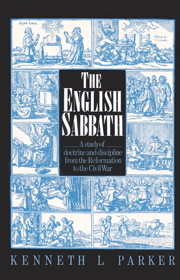Book contents
- Frontmatter
- Contents
- Acknowledgements
- Abbreviations
- 1 The case for a reappraisal
- 2 Medieval sabbatarianism and Reformation reaction
- 3 Early Elizabethan sabbatarianism: 1558–82
- 4 Late Elizabethan and Jacobean sabbatarianism: 1583–1617
- 5 The Book of Sports controversy: 1617–18
- 6 The 1620s: continued consensus
- 7 The sabbatarian controversy
- Epilogue
- Appendix
- Bibliography
- Index
2 - Medieval sabbatarianism and Reformation reaction
Published online by Cambridge University Press: 23 November 2009
- Frontmatter
- Contents
- Acknowledgements
- Abbreviations
- 1 The case for a reappraisal
- 2 Medieval sabbatarianism and Reformation reaction
- 3 Early Elizabethan sabbatarianism: 1558–82
- 4 Late Elizabethan and Jacobean sabbatarianism: 1583–1617
- 5 The Book of Sports controversy: 1617–18
- 6 The 1620s: continued consensus
- 7 The sabbatarian controversy
- Epilogue
- Appendix
- Bibliography
- Index
Summary
The argument used to deny the pre-Reformation origins of the sabbath doctrine rests on two basic assumptions. The first is that medieval rigorism in the observance of Sundays and holy days was based solely on the authority of the Church as defined in canon law. A second and related point concerns the way some historians perceive medieval uses of scripture. Solberg observed that ‘the Christian Sabbath was one of many non-scriptural elements present in late medieval religion’. The assumption that the protestant slogan sola scriptura marked the beginning of a serious use of scripture, particularly in developing a doctrine of the Sabbath, is apparent in many studies. However, these assumptions are difficult to defend when faced with evidence of medieval Sabbatarianism which was grounded in scripture, and the uses made of these sources by Elizabethan Sabbatarians.
The first issue to be clarified in any study of Sabbatarianism is the definition of sabbath observance. In the last fifty years, most historians have agreed that there was a consensus on this matter in the first fifteen years of Elizabeth's reign. Bishops, clergy, and godly laymen shared a concern that parishioners attend services, perform spiritual exercises, abstain from worldly labours, trading, drunkenness, gluttony, and idleness. The most frequently cited evidence for this concern is the homily, ‘Of the Place and Time of Prayer’, which was one of the homilies prescribed for use in parishes when a sermon by a licensed minister was not delivered. Exhortations and complaints found in the works of Bishop Pilkington, Alexander Nowell, Thomas Becon, William Kethe, and others are cited to illustrate this consensus.
- Type
- Chapter
- Information
- The English SabbathA Study of Doctrine and Discipline from the Reformation to the Civil War, pp. 8 - 40Publisher: Cambridge University PressPrint publication year: 1988



